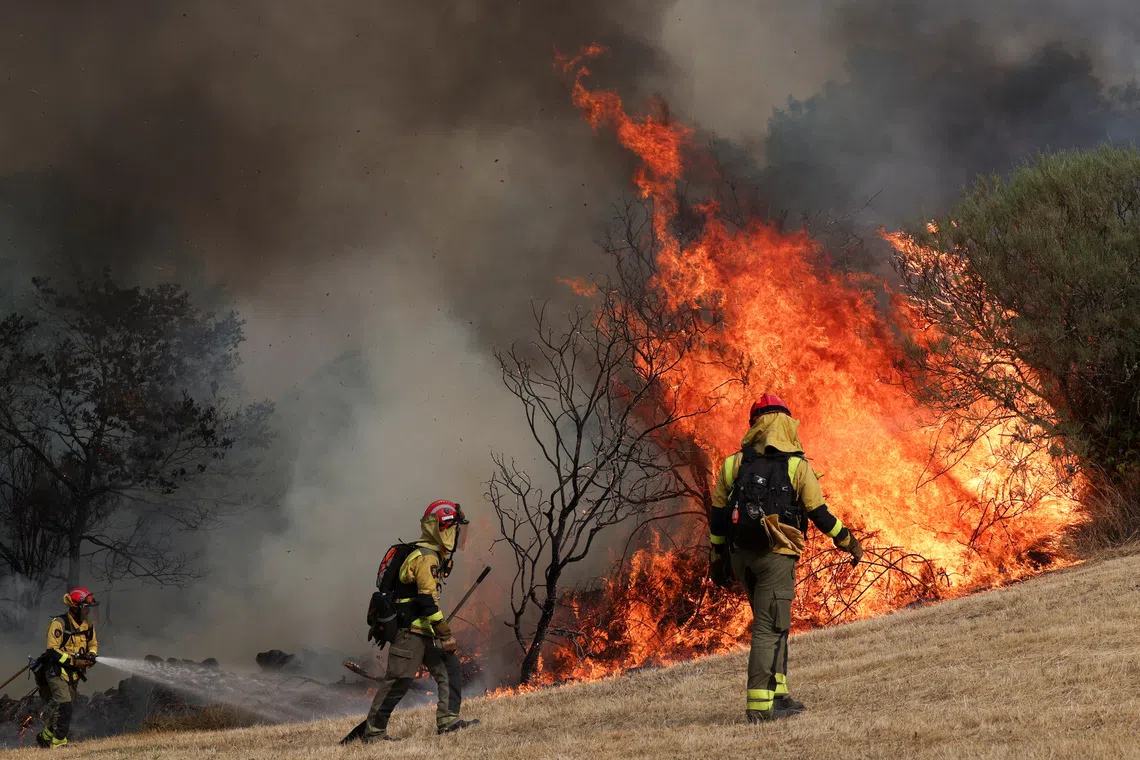Spain’s summer of wildfires fuels calls for better forest management
Sign up now: Get ST's newsletters delivered to your inbox

Spain’s Prime Minister Pedro Sanchez in August acknowledged that wildfire prevention had been “clearly insufficient” and forestry management inadequate.
PHOTO: REUTERS
Follow topic:
PARAFITA, Spain – Mr Javier Fernandez Perez recalls how residents of his hamlet used to burn undergrowth during the winter to help prevent the sort of huge wildfires that scorched Spain’s north-western Galicia region last summer.
With hotter and drier weather stoking larger and more destructive fires, experts and locals alike are calling for such fire breaks, and other forestry management methods and incentives to urgently be implemented to avoid a repeat in years to come.
Southern Galicia was the epicentre in Spain’s worst fire season in three decades. During a record heatwave in August, wildfires killed four people, encroached on cities and towns, and charred 330,000ha, an area twice the size of London.
“If nothing is done to prevent fires, this will happen again in about six years’ time,” said 72-year-old Mr Fernandez Perez, a retired waiter and baker, pointing to the ferocity of the blazes if they ignite with more or less unlimited vegetation to burn.
Spain’s experience is trial for Europe
Just weeks ago, a wildfire ravaged 19,000ha of land around his hamlet of Parafita. “There’s no way to control that. Not even with helicopters, all of Spain’s helicopters, or aeroplanes or anything else,” he said.
Forestry experts and political leaders said a lack of investment in forestry management and fire prevention over the past two decades was what made the fires so devastating.
Fresh solutions must be replicated across Europe as fires get closer to populated areas, said Dr Victor Resco, a professor in forestry engineering at the University of Lleida.
“What we are seeing in Spain is a trial for what Europe can expect,” he said. “In 20 or 30 years, when temperatures increase in central and northern Europe, it will be too late to change tack.”
Spain’s Prime Minister Pedro Sanchez in August acknowledged that wildfire prevention had been “clearly insufficient” and forestry management inadequate. He pledged to do “whatever it takes” to ensure fires on such a scale never happened again.
Forest coverage expands, some management lax
Spain is behind only Sweden and Finland in forest cover in Europe, covering 18.6 million ha, and its forests grow 2.2 per cent every year compared with the European average of 0.51 per cent, according to private forest owners’ association Cose.
That increases the area that must be managed, while rural depopulation means the regional authorities must fund prevention work previously carried out by communities.
There are fewer people to tackle the areas where vegetation has surged in a rainy spring and then dies away in the heatwaves as weather patterns are disrupted by climate change, leaving hectares of natural kindling ready to burn.
Legislation in Spain to regulate controlled burning has also complicated such preventative practices.
Two thirds of Spain’s forests are privately owned, largely by individuals who have limited forestry management experience. Environment ministry data shows that less than a quarter of forest areas have long-term sustainable management plans.
“In some cases, two generations of owners have never even set foot on the plots of land they own,” Spain’s Environment Secretary Hugo Moran told Reuters.
The government should offer tax breaks for forest owners to reflect the role they play in carbon capture and water management, and as wildlife refuges, said Ms Patricia Gomez Agrela of Cose.
It should fund forests to become more economically viable through the exploitation of wood, biomass, cork, seeds, mushrooms and fruit as in Nordic countries, she said.
“There is a European strategy of biodiversity which promotes no intervention in some areas but this accumulates a lot of vegetation that generates a high risk of fires and you then lose the biodiversity that you were trying to conserve. We have to find a balance,” she said.
Money is tight
Spain’s Forest Engineers Association estimates that every euro invested in prevention reduces the cost of extinguishing the blazes by €100 (S$150). Greenpeace and other groups want the authorities to invest €1 billion a year in fire prevention.
Investment by the national and regional governments in core wildfire prevention methods such as maintaining fire breaks and reservoirs fell by 52 per cent between 2009 – just as the financial crisis took hold – and 2022, according to the most recent data compiled by the environment ministry.
Spending on forestry declined by 22 per cent in the same period, although expenditure on firefighting remained stable.
The ministry and regional governments, which are primarily responsible for fire prevention and firefighting, say investment began to increase again from 2017 to 2018.
They also say the data does not reflect different ways of categorising methods and spending from the interior and agriculture ministries that support fire prevention.
‘Greatest threat’ to security
However, Spain dedicated a smaller chunk of post-pandemic EU funds to wildfire prevention than southern European peers also hit by them. It spent €221 million of EU funds on preventing wildfires and preparing a rapid response, almost three times less than Portugal and four times less than Greece, according to a report in June by the European Court of Auditors.
Money remains tight. Mr Sanchez’s minority Socialist-led government has come under intense pressure from Nato partners and US President Donald Trump to increase Spain’s lagging defence spending by almost €50 billion a year.
Also facing the clean-up costs for devastating floods in Valencia and the wildfires, he has argued climate change adaptation and mitigation should also be defined as defence.
“It is unreasonable to think that we should increase defence budgets while relegating to the back burner what is currently the greatest threat to the security of our citizens,” Mr Moran said. REUTERS

